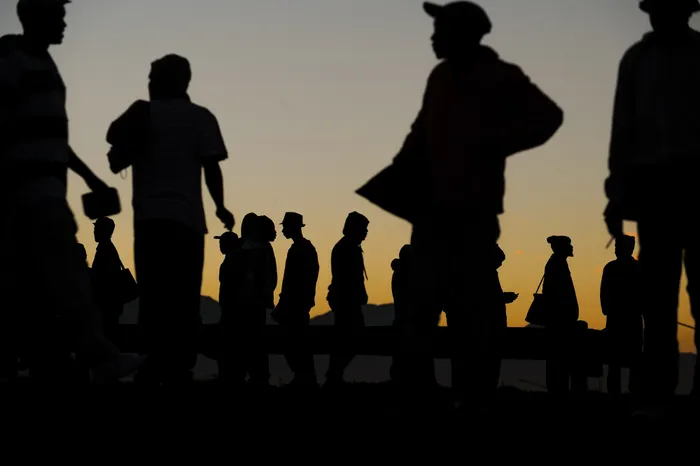
Young South Africans, particularly women, are being warned that fake foreign job offers circulating on social media are putting them at serious risk of exploitation and human trafficking.
Image: Henk Kruger/Independent Newspapers
IT IS often said that “the most dangerous threats oftentimes come wearing a friendly face”. It seems this is the case for South Africa, where human trafficking has been ravaging our society of late.
Mere weeks ago, it was widely reported that more than 200 South Africans were currently stranded in Thailand, after having been lured into a sophisticated human trafficking ring with the false promise of employment in Myanmar.
This past week, various South African influencers were entangled in a national uproar after promoting the Alabuga Start programme, which was found to be a human trafficking scheme luring countless young women in with the promise of Russian-based work and education.
What this has actually highlighted is that social media has become a whole new frontier for traffickers, and now more than ever, these dangerous syndicates are hiding in plain sight — behind the guise of innocent likes, shares, and friendly DMs.
This is a frightening reminder that when trust is exploited to funnel youth into dangerous traps, we must question not only the schemes but the systems that allow them to thrive. In our post-apartheid society, human trafficking is often attributed to a combination of gender inequalities and economic disparities and instability.
According to the World Bank, over 60% of the entire nation was living in poverty in 2025. Furthermore, a report by the University of Johannesburg showed that trafficking occurs at a slightly higher rate for girls than boys, with 55.5% of all trafficked South Africans being female, and 44.5% being male. This report further estimated that more than three-quarters of all victims are between the ages of 12–25, highlighting a terrifying reality: that a significant portion of victims are mere children.
According to the United Way South Africa, there are estimated millions of people trafficked across the nation on an annual basis, with roughly only 50–100 000 cases being found.
Human trafficking syndicates operate on a far more advanced level. Although there are many victims that are snatched from the streets or abducted from their homes, there are far more that are coerced into entering these syndicates voluntarily, desperate for a way out of poverty and the pursuit of a better life.
The World Bank, Stats SA, and many others have infamously deemed South Africa the most unequal country in the world. In fact, this has been the case since the abhorrent apartheid regime, which fostered deep-seated socio-economic divides in terms of opportunity, labour access, and resource allocation. The legacy of the racially motivated, inhumane policies of apartheid continues to be felt across our society today. This leaves many people desperate.
Additionally, this has essentially left millions of South Africans trapped in generational poverty, with limited access to quality education, meaningful employment, and basic services - continuing a legacy of injustice that remains painfully unresolved for many.
This legacy of inequality has made young people - especially women and children - some of the easiest targets for human trafficking in South Africa. For the millions of people who are growing up in poverty, with no real access to education, job security, or safety, even the most dangerous offers can seem like a legitimate lifeline. Traffickers know this, and they exploit it mercilessly — luring our predominantly unemployed youth in with fake job offers or scholarships, targeting children for domestic work, forced labour, or sex trafficking.
But what lies on the other side of trafficking is nothing short of horrific: victims are often raped, abused, and sold repeatedly; many are forced into drug addiction to keep them compliant, or end up homeless, imprisoned, or dead. In a country where systems meant to protect the vulnerable are failing dismally, it’s no surprise that so many disappear into these syndicates - unnoticed, unprotected, and unheard.
The fact is, human trafficking syndicates will continue to hunt for victims in places where there is little to no protection from exploitation, weak government, poverty, corrupt law enforcement, and social systems that fail to provide basic safety and support.
From TikTok to WhatsApp, to Email phishing, these dangerous networks thrive in environments where desperation is high and oversight is low, exploiting the gaps in our society to trap vulnerable individuals. Until these root causes are addressed, traffickers will keep preying on those with the fewest options and the least power to fight back.
The harsh reality is that human trafficking syndicates operate in plain sight — hiding behind the screens of social media platforms, exploiting the trust of everyday users and even influencers who unknowingly broadcast their schemes. Raising awareness, especially among digital communities, is crucial to dismantling these networks.
We should educate ourselves and others about how traffickers manipulate opportunities and prey on vulnerabilities right here in our society every day.
Only through vigilance, informed voices, and collective responsibility can we hope to expose and stop these modern-day horrors. If we fail to see and act, we risk becoming a society that silently disappears beneath the weight of its own ignored injustices.
As our prolific First President Nelson Mandela once said: “Safety and security don’t just happen; they are the result of collective consensus and public investment.”
* Tswelopele Makoe is a gender and social justice activist and editor at Global South Media Network. She is a researcher, columnist, and an Andrew W Mellon scholar at the Desmond Tutu Centre for Religion and Social Justice, UWC.
** The views expressed here do not reflect those of the Sunday Independent, IOL, or Independent Media.